- What is Blockchain?
- Steps to create a blockchain startup
- Research and understand the market trends
- Create a blockchain prototype
- Understand blockchain features
- Select the best blockchain platform
- Choose the most promising niche
- Review the development stages
- Find the right team
- What can blockchain do for your startups?
- Can make you early adopters
- Can replace antiquated processes with digital systems
- Can secure their data
- Benefits of using blockchain for your business
- 1. Payment and money transfer
- 2. Contracts creation and abiding
- 3. Distributed cloud storage
- 4. Protection of digital identity
- 5. Supply chain management
- 6. Quality customer support
- 7. Advertisement and promotion
- 8. To generate funds
- Challenges startups will have to overcome
- Complexity in regulations
- Presence of legacy systems
- High hack incidents
- Enterprise blockchain system platforms
- Blockchain supply chain startups
- Blockchain healthcare startups
- Blockchain real estate startups
To start with, blockchain technology is as powerful as the Internet itself from the time when it was deemed to be overhyped to now when it has become an important part of a number of industries, banks, and governments.
According to Grand View Research, the global blockchain technology market size was valued at USD 5.92 billion in 2021 and is expected to grow exponentially at 85.9% from 2022 to 2030.
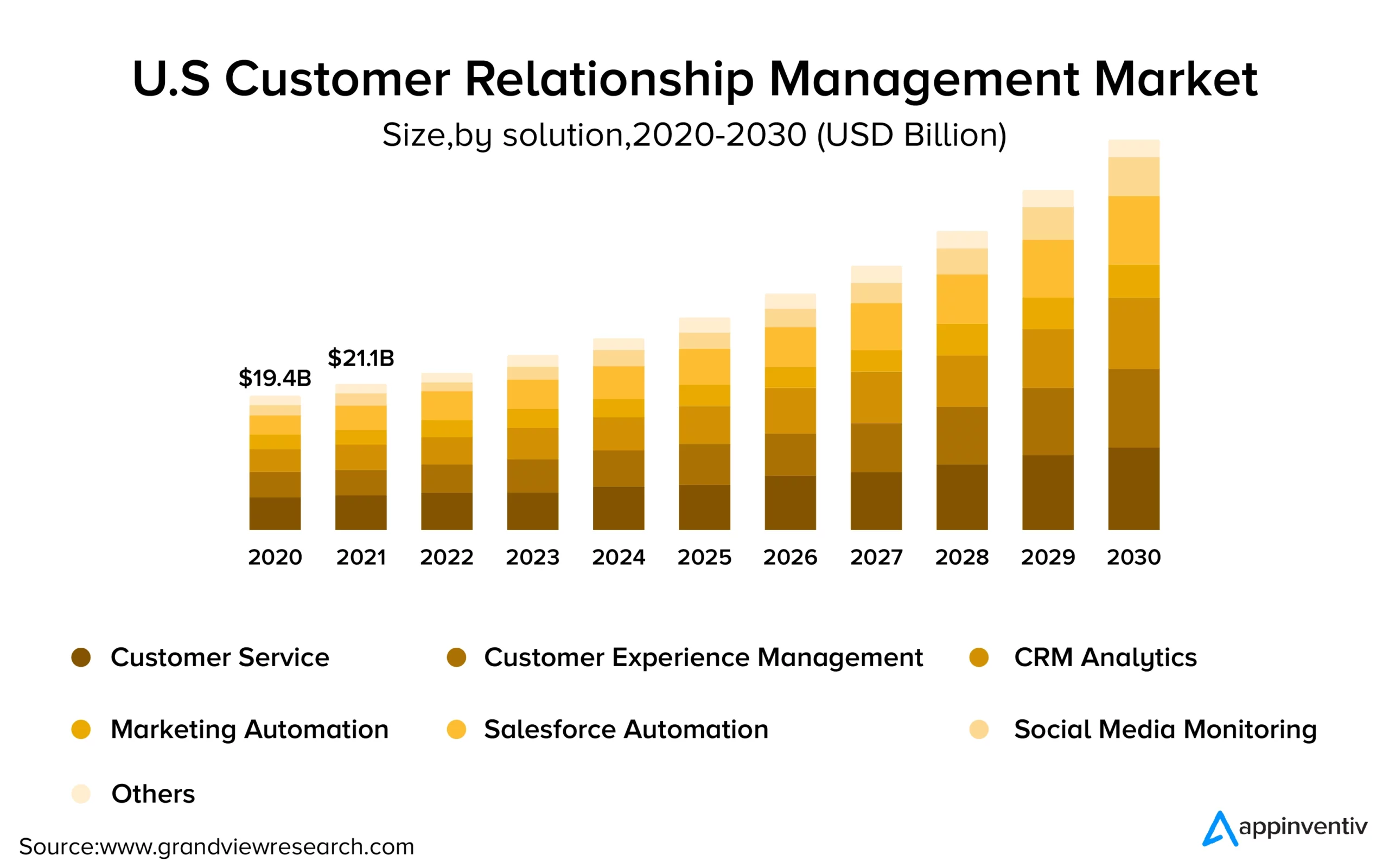
Moreover, blockchain technology has made a prominent place in a number of processes on a very high level and has found associations among a number of big brands like – Walmart, IBM, Oracle and more.
Our intent today is to make blockchain a technology occurrence that can be implemented on mass scales by businesses and industries of all sizes and across all categories.
While there have already been several use cases of Blockchain in Enterprise setup, it is the startups that need to reform with the power of blockchain.
This article is for you to get acquainted with the topics like what is blockchain, how blockchain works for startups, how to create a blockchain for startups, and how it can be used to not just make your business efficient but also mark it as a brand that is highly innovative.
We will help you identify the ways blockchain can impact and make your processes a lot easier. And in case you wish to dive deep into the technology’s ABC, head on to our handbook on Entrepreneur’s Guide to Blockchain.
Now without further delay, let’s discuss how blockchain can help your startup operations run more efficiently but before that let’s dive deeper into the detailed concept of blockchain. So, let’s get started!
What is Blockchain?
A blockchain is a database that allows safe, secure, transparent and tamper-proof data storage. This makes it an ideal platform for managing transactions, contracts, and other digital records. In fact, many believe that blockchain will eventually replace traditional databases altogether and has a lot of potential applications for businesses, including startups and tech giants as well.
If you are a budding entrepreneur with a blockchain startup idea to start a new business you must be having several questions in your mind like how blockchain startups work, how do I create a blockchain startup, how to invest in blockchain startups, how do blockchain startups make money and more.
So in order to have answers to all your queries you need to dive deeper into the blog post. To your surprise, you will come to know that blockchain will change every industry in which data can be stored or transactions can be recorded, including retail, finance, banking, energy, healthcare, real estate, supply chain, and more.
Now that we know what is blockchain technology, let’s see how blockchain startups work.
When you have a startup, your goal should be to make your product available to more people than ever before, and this is where blockchain technology startups work best. With this technology, you can create your own cryptocurrency and sell it through exchanges (or even give it away as an incentive for users), which will increase its demand and value over time. This will help you create more investors in your company, which will ultimately lead to increased revenue.
Now that you know what blockchain technology is and how blockchain startups work, let’s take a look at the steps you need to follow to create a blockchain startup.
Steps to create a blockchain startup
If you’re an entrepreneur who is interested to create blockchain technology startups, here are a few steps to get you started:
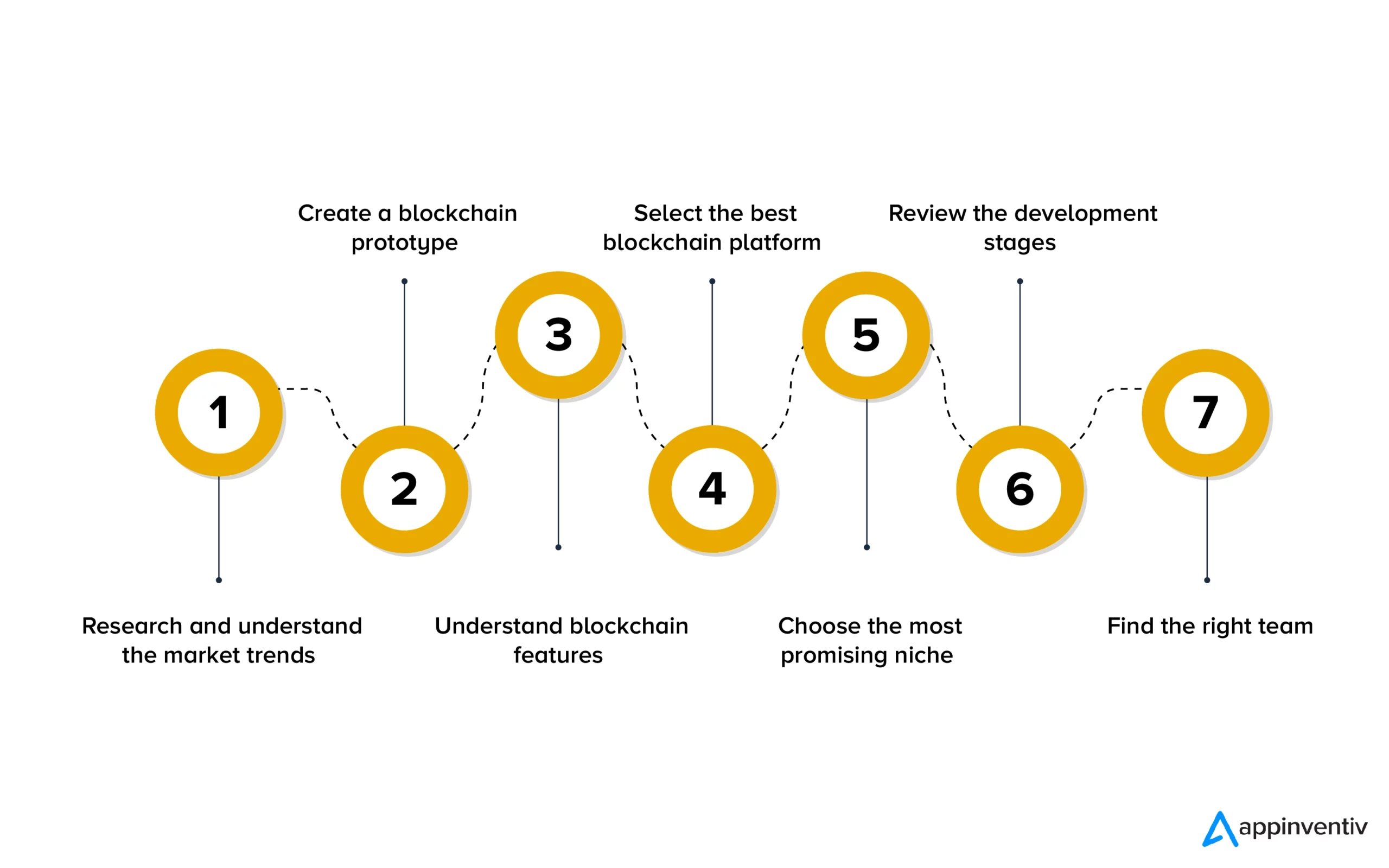
Research and understand the market trends
Before building your blockchain startup, it is important to carry out thorough research about the blockchain industry and understand the market trends. This will help you identify the areas where blockchain technology can be applied and create a solution that meets the needs of the market.
Create a blockchain prototype
Once you have a clear understanding of the blockchain industry and the market trends, you can start working on a blockchain prototype. This will help you validate your idea and assess the feasibility of your project.
Understand blockchain features
It is important to understand the features of blockchain technology and how it can be used to create a blockchain startup. Some of the key features you need to focus on are security, value transfers, smart contract platforms, immutability, transaction verification, and decentralization. By having a clear understanding of these features, you can easily visualize how to include them in your blockchain startup.
Select the best blockchain platform
If you have a blockchain startup idea, then it is advised to select the best blockchain platform for your project. There are various free and open-source platforms available out there, which can help your startup in many ways.
Some of the popular open-source blockchain platforms include Hyperledger Fabric, Ethereum, Corda, etc. Each of these platforms has its own features and functionalities.
Choose the most promising niche
Blockchain technology has the potential to revolutionize the entire world. If you want to get your business on board, you’ll need to choose a niche that’s right for it.
Blockchain is an innovative technology, but it doesn’t have a specific industry or sector. That means it can be used in a variety of different sectors. The best way to start using blockchain is to identify its most useful applications for your company. Each application requires different tools and approaches, so you should do research before you begin building your blockchain solution.
Some of the popular blockchain niches include healthcare, law, government, banking and finance, media, supply chain management, etc. By choosing the best blockchain niche, you can create a blockchain startup that has the potential to change the entire business.
Review the development stages
If you’re building a blockchain startup, reviewing the development stages will help you get started. These development stages include – installation, setup, granting access, building a blockchain, contracts, and making an application. By reviewing these development stages, you can easily assess the progress of your blockchain startup/cryptocurrency startup and identify the areas where improvement is needed.
Find the right team
A successful blockchain startup requires a strong team of blockchain developers that have the necessary skills and experience blockchain app development. It is important to choose the right team that shares your vision and is passionate about blockchain technology. Talented blockchain developers are hard to find and much more expensive to get. But not to worry, every problem has a solution. You can always look forward to the experts in the market offering the best blockchain development services to cater to your business needs.
By having the right steps in place, your business can become one of the top blockchain startups that helps make a digital transformation. Also, with each progressing step, you need to know what blockchain can do for your business.
What can blockchain do for your startups?
As startups get involved with blockchain, it is important to understand the technology and its impact before working on a project. So, for a better understanding, we have listed a few pointers that will let you know how blockchain is helpful for your startups.
Can make you early adopters
Just like the starting days of the Internet, the Blockchain world is underdeveloped to a huge extent. There are a number of critical elements that will have to be addressed before Blockchain becomes a mass phenomenon.
For startups that are willing to act as fast movers and follow the plant the flag strategy, there is a golden opportunity to conceive and grow a community before space becomes too overly crowded with Blockchain business applications.
By investing time and resources to develop a business model with Blockchain at the center of the processes or even a major part of the working mechanism, will automatically give startups an edge over others working in the same domain – something that all startups need in a time where there are thousands of businesses working in the same category, fighting for the same piece of the market.
Can replace antiquated processes with digital systems
A number of startups operate on some or the other form of legacy software or outdated infrastructure, which not just increases the cost of conducting business but also make them inefficient and inconsistent to a great extent. Plus, a great number of vital processes are manual in nature, meaning they are subject to the risk of human error to a massive extent.
With blockchain for small businesses, startups will be able to solve a great amount of these issues. The technology is known to decentralize the pool of data segregated among a great number of different processes – something that solves the startups’ need to rely on manual labor to collect and process data.
Can secure their data
Cybersecurity is a point of concern for companies of all sizes across industries. The global spending on cyber security-based services and products like automation and IoT is estimated to increase by $1 trillion in the coming five years.
Noting the incredible security proof that Blockchain systems come with, they are poised to soon become the de-facto mode of gathering and organizing the enterprise data – and a primary answer behind the question of why companies use blockchain.
All the data gathered in the ledger gets automatically encrypted with the newest and greatest of the cryptographic methods; the warehouses are only accessible through a key-value mechanism, which validates and authorizes the identification before granting access.
Moreover, the decentralized mechanism of Blockchain for small business reduces the security risk to a great extent. As the distributed system cannot get manipulated by any single entity, it is impossible for hackers to change the data without notifying everyone in the network – something that protects against corruption and give the control back to the actual users.
If you are planning to integrate blockchain technology in your energy business, check out our latest blog on How Is Blockchain Disrupting The Energy Sector to understand the impact of this rapidly evolving in detail.
Now that you have seen how blockchain can make your startup more efficient, let us look at the benefits of using blockchain for your business and the steps to implement blockchain in your business.
Benefits of using blockchain for your business
Here are some of the top-most benefits of using Blockchain in your business –
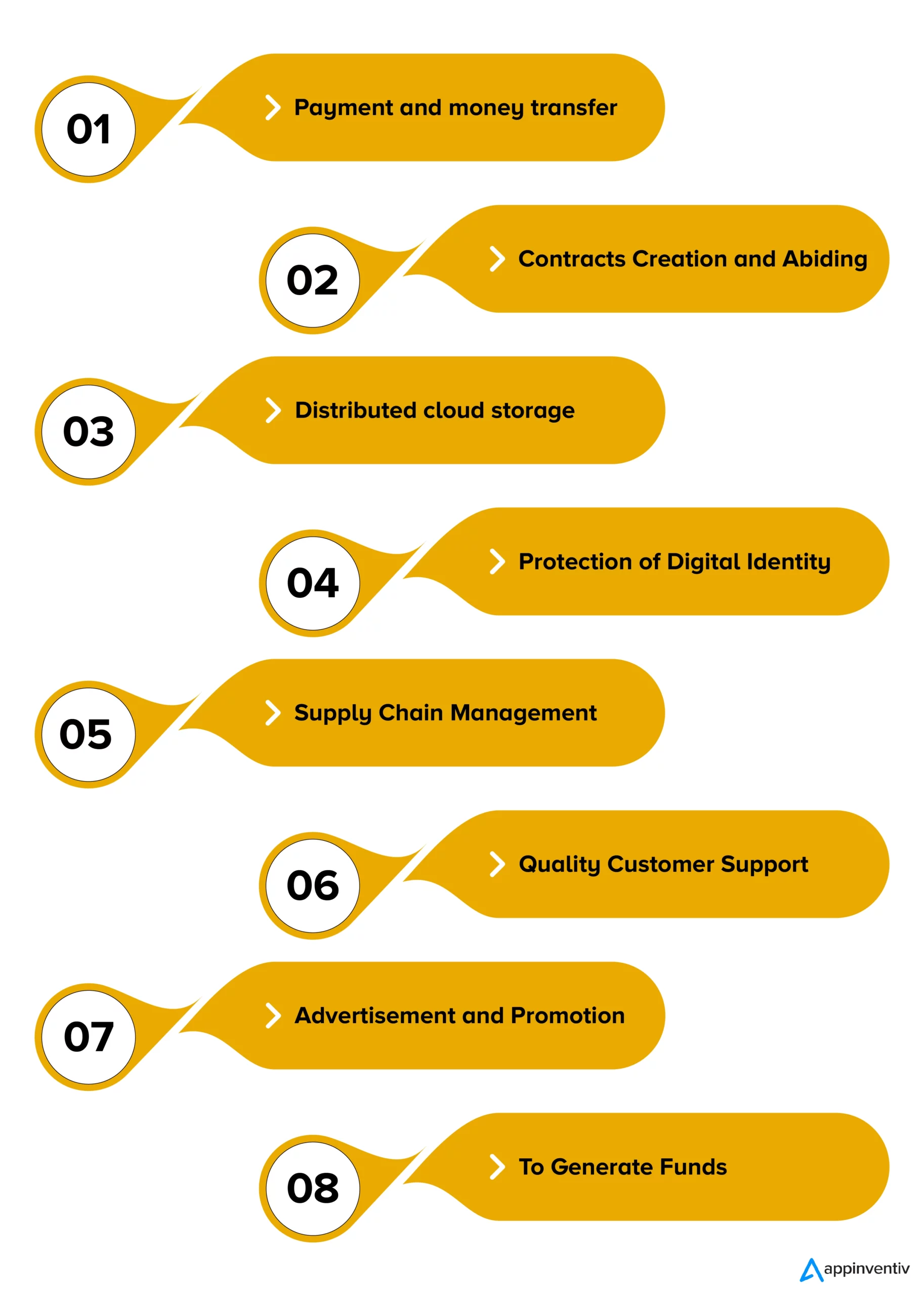
1. Payment and money transfer
One of the most common benefits of Blockchain in a startup is seen in the payment and money transfer domain.
The present-day story is that Blockchain is ready to transform transactions. Blockchain with its cryptocurrency element comes in handy for making cross-border payments easier and a lot more cost-effective than the traditional mode of payments, which are crippled by high transfer charges.
2. Contracts creation and abiding
As you are just starting, there are a number of contracts that you will have to get binded into – with your interior designers, your food and beverage vendor, your offshore software development company, and a number of other third-party stakeholders.
With so many contracts to be followed, the use of Blockchain in business can come in very handy, through the Smart Contract route. Since we have already talked about the concept in our Smart Contract guide before, we won’t get too much into the depth of the mechanism here, but what we can tell you with respect to Contracts and Blockchain is that it is impossible for any of the involved parties to break the Smart Contract.
3. Distributed cloud storage
A distributed cloud-storage comprises solutions around peer-to-peer decentralized cloud storage. By using the combination of cryptography and Blockchain to protect the files on both – transmission and in nodes – decentralized cloud storage makes your files unhackable and Blockchain a useful element of your startup.
In layman’s terms, distributed cloud storage system comes into existence when every element of the cloud storage, like processing, transport, and storage of data is put into the blockchain ecosystem. Once that happens, every data – how it moved, who accessed it, and how it was governed – can be seen by everyone who has the access to the Blockchain. A system of this type helps in offering full accountability, traceability, and transparency for cloud, and entities that are either using or managing the cloud.
Also read – Cloud Computing – An Ultimate Guide for Businesses
4. Protection of digital identity
Another crucial application of Blockchain in businesses is Identity Management.
Identity management is something that the world suffers from. No matter what business or team size you belong to, you are never truly safe from your identity being leaked on the internet, and in the worst case scenario, in the hands of the hackers.
In the case of startups, what happens is that they – in an ode to seek growth and efficient performance – sign up and subscribe to a number of websites that in some cases can be malicious.
Blockchain, in this case, can be used as a platform to protect identities from fraudulent activities. The technology can help businesses handle the problems of reconciliation and authentication faced by a number of industries. Moreover, it allows businesses the freedom to develop encrypted digital identities that replace usernames and pin codes with comprehensive security elements that are capable of saving the institutions and their customers’ valuable resources and time.
5. Supply chain management
There are a number of different ways Blockchain can be used in business when it comes to the Supply Chain Management process, to make it more real-time, accessible, transparent, and efficient. Here are the different applications of Blockchain in SCM –
Provenance Tracking
In the blockchain-powered supply chain management process, provenance tracking and record–keeping become very easy as the product information can be easily accessed through RFID tags and embedded sensors. Everything about the product, straight from origination to its present status can be tracked via Blockchain. Along with this, provenance tracking can also be used for the fraud detection in any part of the supply chain.
Cost reduction
When blockchain is used in supply chain for speeding up the administrative processes, the additional costs occurring in the system gets automatically reduced with the transactions’ security guaranteed. Secondly, the elimination of intermediaries and middlemen in the supply chain lowers the chances of product duplicacy and fraud, while saving them a lot of money. The payments made can even be processed by the suppliers and customers in supply chain with cryptocurrencies rather than them relying on the EDI.
Establishing trust
Having trust in complex supply chains with many participants is necessary for smooth operations. For example, when a manufacturer shares his products with suppliers, he/she should be able to depend on them for following factory safety standards. Also, when it comes to regulatory compliances such as custom enforcers, trust plays a vital role. The immutable nature of blockchain in the supply chain is well-designed to prevent tampering and establishing trust, marking trust as the primal application of Blockchain in business.
6. Quality customer support
There are two ways through which Blockchain is used in Business for increasing the quality of customer support.
- Data cleansing – Whether it’s due to inept data import tools or human negligence, CRM users all over the world have to deal with inaccurate or duplicate data at some level. With blockchain in place, a customer can have their very own personal block that presents companies with a unified and accurate picture of their personal information, past transactions, subscriptions, etc. Hence, blockchain helps these companies circumvent the issue of inaccurate, obsolete and duplicate data records altogether. This consequently yields better insights into customers and helps businesses engage them more effectively.
- Loyalty programs – Loyalty programs aim to drive profits by adding value to the customer experience. However, due to their variable mileage, volatile value, and associated privacy concerns, they prove to be cumbersome for customers and yield a low ROI. However, in a manner very similar to cryptocurrencies, brands can make use of blockchain to reimagine and reinvigorate their loyalty programs. With blockchain, consumers would have a single decentralized wallet that is compatible with all brands. They would not be bound by the rules and limitations of individual brands and point redemption would be greatly simplified. The consumer will have far greater control over the whole experience and brands will complete for their wallet by offering them better deals.
7. Advertisement and promotion
The need for promotion is something that is unignorable for startups who are just starting up and are in need of awareness in the market. Even after being one of the most important elements of a business, advertisement industry is filled with a number of loopholes that makes it unnecessarily expensive and opaque for the startups.
When blockchain is introduced to the mix, there are a number of things that gets sorted and streamlined on the promotion front.
Let us look at the benefits of using Blockchain in your business in terms of decentralized advertising.
- Better audience targeting
Earlier, as marketers, we used to rely on more than one source to get information on users’ buying habits. But now with blockchain, advertisers will get the freedom of creating buyers’ demographics by getting the necessary information straight from the buyer themselves. The technology will gather all the information that the users wish to share in their buying patterns and get them to the advertisers.
- Reliable ad buys
The problem with online advertising is the lack of knowledge related to the fact that it is absolutely difficult to know whether the people who clicked on the ads were genuine buyers or paid clickers. However, since blockchain is transparent, advertisers can easily make out if the clicks that they are getting, even coming from the population they are targeting or not, are genuine or fake. This way, the ad buys would prove themselves to be of value to money.
- Ad verification
Many times, you see a banner advertisement on the Facebook listing price of the product as N, but when you visit the site, the number is shown as X. The identification and rectification of issues such as these are the tasks done by the Ad verifiers, whom the networks pay heavily to. However, blockchain helps ensure that the actual information is exactly the same as what is shown in an advertisement. It reduces the heavy cost that is associated with the ad auditing process.
- Management of advertisement Inventory
Ad inventory, as we all know it, is the space that advertisers have for ad selling. It can be calculated on the monthly basis. The information that goes into the whole ad inventory management cycle – number of space, length of the advertisement, maintaining records of which day is assigned to which brand, the amount that has to be charged space placement-wise, etc are way too much to handle manually. By using smart contracts and blockchain, brands can not just manage the inventory better but also get payments from advertisers on time.
Also read – 10 Reasons Your Business Needs an Inventory Management Software
8. To generate funds
One of the biggest signs of success for any startup and also the one which helps them grow to their maximum ability is the number of investments that they receive. The moment your startup gets backed by investors, you don’t just become an establishment to look out for but also get sufficient funds to support your growth and expansion needs.
Now, when we talk about generating funds or raising investments, there are quite a few options available to the startups and entrepreneurs – crowdfunding, angel investments, venture capitalist, bank loans, small business administration loans, etc. While out of all of these modes of generating funds, venture capitalist has established itself as the most preferred form of raising funds as entrepreneurs get not just funds but also the experience of VC investors, ICO (a Blockchain powered mode of raising fund) is soon replacing the VC model.
There are a number of reasons that have not just brought the demand for VC and ICO at an equal stage but have also increased the fund investment count for ICO fund model. But, the ones that make ICO ideal for you are:
- Easier:
Compared to the VC fund model that asks for entrepreneurs to come prepared with validating market and financial response that proves how your startup or idea is a success, ICOs have a lot fewer benchmarks to follow, making it easier for entrepreneurs to raise funds through the ICO route.
- Global:
While VC funding operates within a set geographical boundary, ICO can be raised from investors in the UAE while you are in Australia.
- Speedy:
As opposed to the VC funding timeline to raise funds, ICO lasts for around 30 days only making it a lot speedy for entrepreneurs to raise money.
So, here were the several benefits and implementation steps that come tagged with the integration of blockchain in a startup. But, these benefits like all the genuine, validated benefits, don’t come without their set of challenges.
Especially when the technology is as disruptive and less explored as Blockchain, the instances of businesses facing a challenge in its implementation is very obvious.
Let us look at what challenges startups face and the probable solutions to overcome and adopt the technology in the business process.
Challenges startups will have to overcome
Complexity in regulations
The biggest obstacle facing enterprise blockchain adoption is the lack of regulations safeguarding entrepreneurs if something goes wrong. While there are a number of regulations coming up aimed at bettering the blockchain adoption rate, the time when you will have a legal regulation in place is still far away.
Presence of legacy systems
Startups that wish to actually benefit from blockchain will have to have a DLT–based infrastructure, something that requires technical know-how and capital. The solution to this is investing in skilled blockchain developers who know how to integrate the technology in the existing system and then integrate on a small scale rather than going all in.
High hack incidents
The internet is filled with blockchain hack events causing people a loss of millions and millions of money, making safety the biggest factor keeping blockchain that receive full enterprise adoption.
The solution to this challenge is employing a private or permissioned blockchain ecosystem instead of a permissionless or open blockchain. By making blockchain permissioned, you add another security level to the mechanism, making it completely unhackableNow that we have seen how blockchain can make startups more efficient and the probable challenges that you need to conquer, it is time to look into the blockchain platforms that you will have to work around to employ the technology in your startup.
Enterprise blockchain system platforms
Here are the platforms that we have been trusting for the development of enterprise–grade Blockchain system for your startups –
- Hyperledger Fabric
- Quorum
- VechainThor
- R3 Corda
- Hedera Hashgraph
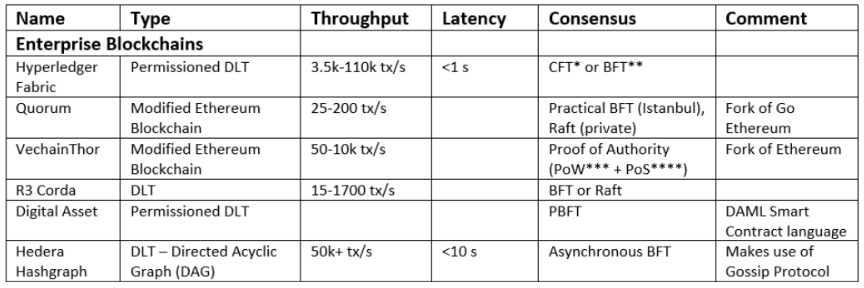
As you could see, enterprise blockchain systems usually have a lot more output, lesser latency, and a lot less complex consensus protocols compared to standard public blockchains such as Ethereum or Bitcoin.
With this, now you have a clear idea on why to invest in blockchain startups, various applications of blockchain in your business, how to build blockchain startups and the industries in which it can be used for market growth.
Moving further, let’s know how Blockchain is used in various industries.
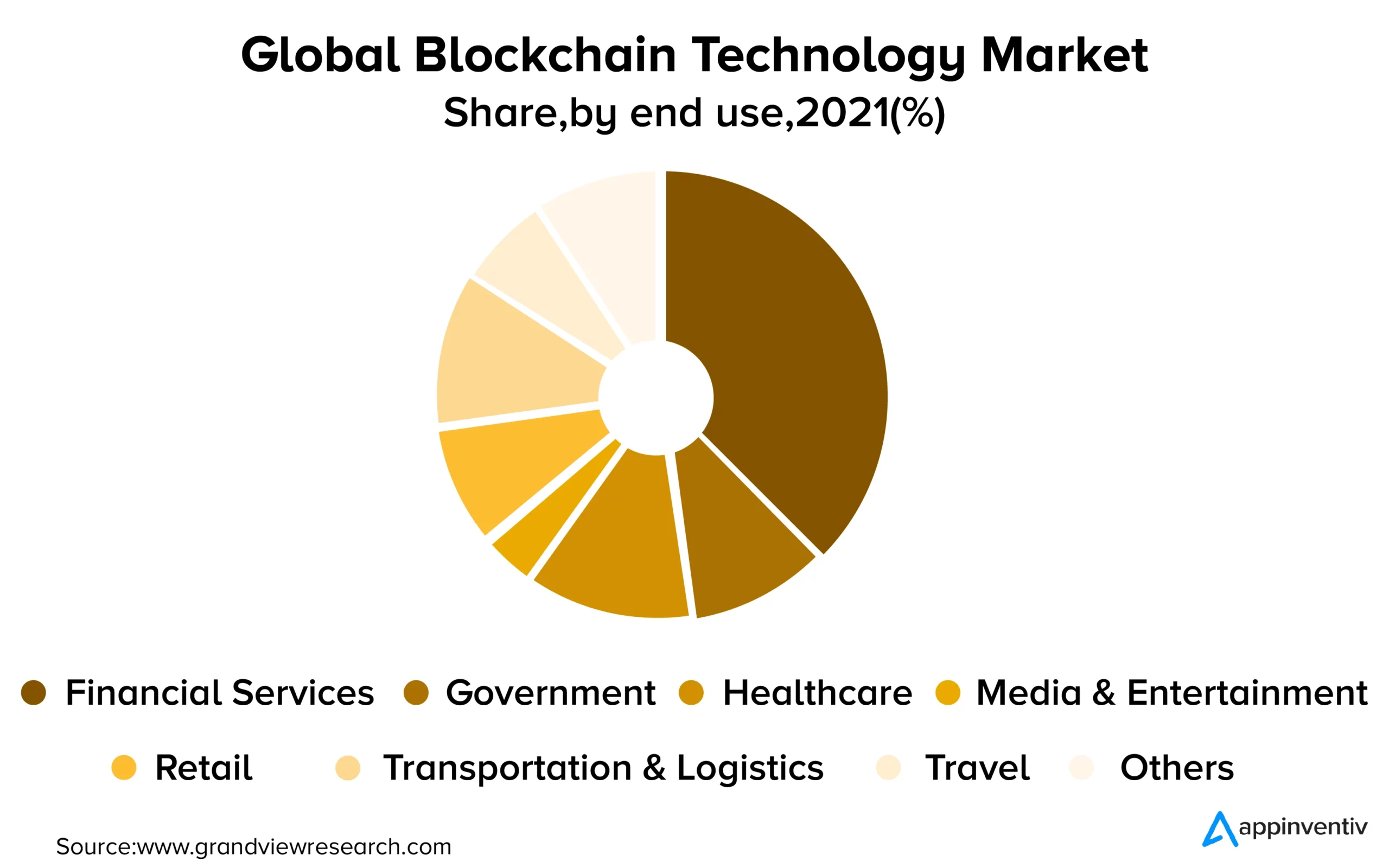
Blockchain supply chain startups
There are a number of blockchain supply chain startups that have been launched in various industries. In supply chain logistics, blockchain can be used to track goods from the point of origin to their final destination. From the raw material stage through production, processing, packaging, distribution and consumption, companies will be able to provide their customers with detailed information about their products.
Blockchain healthcare startups
In the case of blockchain healthcare startups, blockchain helps with the storage of medical records. Medical records are often stored with different providers, making it difficult to access them when they’re needed quickly. Because blockchain stores data in blocks, the information is much more secure and easier to access.
Also Read: Blockchain in Healthcare: Breaking Barriers & Redefining the Industry
Blockchain real estate startups
Blockchain is already having a major impact on the real estate industry, particularly in the areas of smart contracts, land registries, and identity verification. These smart contracts are digital contracts that are stored on the blockchain and can be used to automate a variety of real estate transactions, including title transfers, mortgage approvals and rental agreements.
Also, it can be used for identity verification and land registries to verify someone’s identity or check ownership of land or property as this can be a difficult task. However, with blockchain, this process can be done quickly and securely.
Not just these sectors are benefitted from blockchain but other industries like advertising, government, legal and more find themselves solving problems of customers by using blockchain as a major technology for their startup.
To conclude, blockchain technology has the potential to revolutionize the entire digital currency space, and it’s evident that Blockchain will be a commonplace technology in the coming years so why not start with it today.


- In just 2 mins you will get a response
- Your idea is 100% protected by our Non Disclosure Agreement.

How Much Does It Cost to Develop a Crypto Wallet App Like Metamask?
Key takeaways: Developing a MetaMask-like crypto wallet can cost anywhere from $30,000 to $250,000+, depending on the complexity of features and integration. The cost breakdown includes development, security, integration with blockchain networks, and ongoing maintenance. A customized wallet opens up new revenue opportunities, brand differentiation, and long-term business growth. Since its launch in 2016, MetaMask…

How Much Does it Cost to Build a Blockchain App in the UAE?
Key takeaways: The UAE blockchain market is rapidly expanding, with the BFSI sector capturing over 50% of the market share. As blockchain adoption accelerates, development costs in the UAE range from AED 55,000 to AED 1.85 million, depending on app complexity and features. Factors such as platform selection, security measures, and third-party integrations directly impact…

How Blockchain Integration Is Optimizing Business Processes in Dubai
Key takeaways: Blockchain is a strategic enabler in Dubai, transforming traditional business workflows by enhancing efficiency, transparency, and automation beyond cryptocurrency applications. Dubai’s supportive regulatory environment and government initiatives (e.g., VARA, Dubai Blockchain Strategy) create a clear, innovation-friendly framework, accelerating blockchain adoption. Integration with legacy systems through modular blockchain solutions enables enterprises to modernize operations…

















